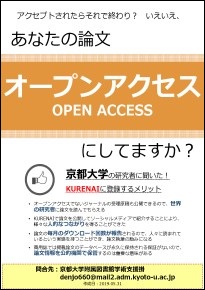How to make your articles open access
What's Open Access?
"Open access" means free availability of peer-reviewed scholarly research on the public internet. Open access not only promotes equal accessibility to information, but also facilitates sharing and reusing the fruits of the research, thus igniting innovation and contributing to the society. Authors also benefit from making their research open access:
- Open access academic articles can be accessed free of charge from all across the world via the internet.
- More citations by peer researchers can be expected.
- Authors themselves can access their own articles online anytime, anywhere.
How to make your articles open access
There are basically two options to make your articles open access:
Green Open Access (Self-archiving)
You can deposit your articles in an institutional repository that your institution operates. (Please note that some journals set conditions for self-archiving.) Kyoto University Affiliates can deposit their research results in Kyoto University Research Information Repository KURENAI.
- Self-archiving by KURENAI
https://www.kulib.kyoto-u.ac.jp/content0/13088&ml_lang=en - Kyoto University Research Information Repository KURENAI
https://repository.kulib.kyoto-u.ac.jp/dspace/?locale=en - KURENAI deposit system (SPS-ID required)
https://openaccess.kulib.kyoto-u.ac.jp/researcher/
https://www.kulib.kyoto-u.ac.jp/content0/13090?lang=en
Gold Open Access (Open access publishing)
Recently, many journals provide an open access option to make your articles open access immediately after the publication by paying article publishing cost (Article Processing Charge, APC).
Reference in deciding which journals to submit your papers to:
When you consider which journals to submit your papers to, "Web of Science" can provide useful information about journals.
- You can check whether each journal is open access or not.
- The statistics and evaluation indices based on the citations in the papers covered by database are also available.
Some open access journals are so-called “predatory journals” that are published solely to profit from the paper submission fees (APC) collected from authors, and are not properly peer-reviewed.
Submitting your paper to such a journal may result in damage to your credibility, so be careful when choosing a journal.
FYI:
- Leaflets: Is this journal legitimate? and Beware of predatory journals (Kyoto University Library Network, Sep. 2020)
- Jeffrey Beall. "What I learned from predatory publishers" (Japanese Ver. by Kyoto University Library)
- Web of Science - Journal Citation Reports
https://clarivate.com/webofsciencegroup/solutions/journal-citation-reports/
Discounts for APC
Kyoto University associates may get discounts of the APC. Please check the list below if a discount is available, before submitting your manuscript to the publisher.
- Discounts for OA Publishing
https://www.kulib.kyoto-u.ac.jp/content0/13089?lang=en
Further Information
Below is the most well-known definition of open access in the Budapest Open Access Initiative (BOAI) 2002.
By "open access" to this literature, we mean its free availability on the public internet, permitting any users to read, download, copy, distribute, print, search, or link to the full texts of these articles, crawl them for indexing, pass them as data to software, or use them for any other lawful purpose, without financial, legal, or technical barriers other than those inseparable from gaining access to the internet itself. The only constraint on reproduction and distribution, and the only role for copyright in this domain, should be to give authors control over the integrity of their work and the right to be properly acknowledged and cited.
The Japanese government is also accelerating its effort to facilitate open access, especially open access of research results funded by public grants.
- Kakenhi Grants-in-Aid for Scientific Research's call for proposals to facilitate publication of open access journals in Japan (2013-)
- Promotion of online journal publication by enhancing functions of J-STAGE, a platform operated by Japan Science and Technology Agency (JST)
- Strong recommendation (April 2013-) and ongoing discussion about mandating open access publishing of JST-granted research results
- Amendment to the degree regulation by the Ministry of Education, Culture, Sports, Science and Technology (MEXT) to mandate open access publishing of doctoral theses on the internet (April 2013)
